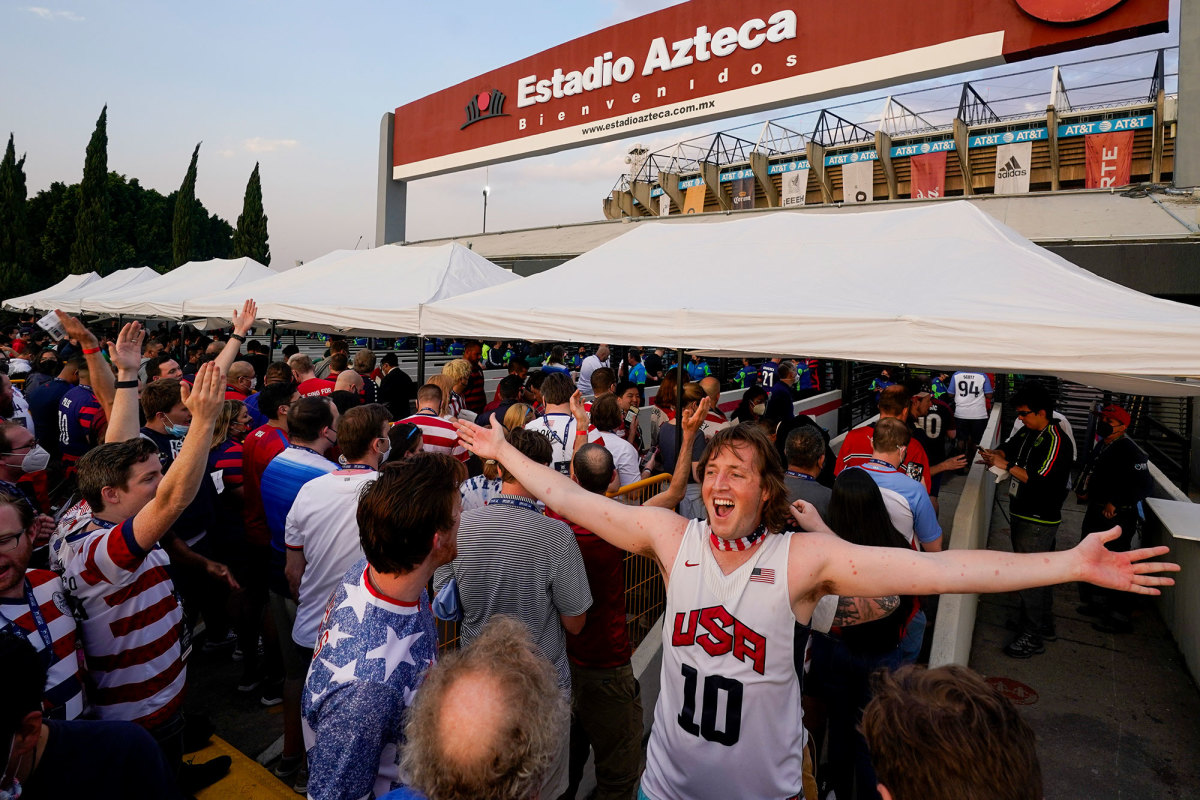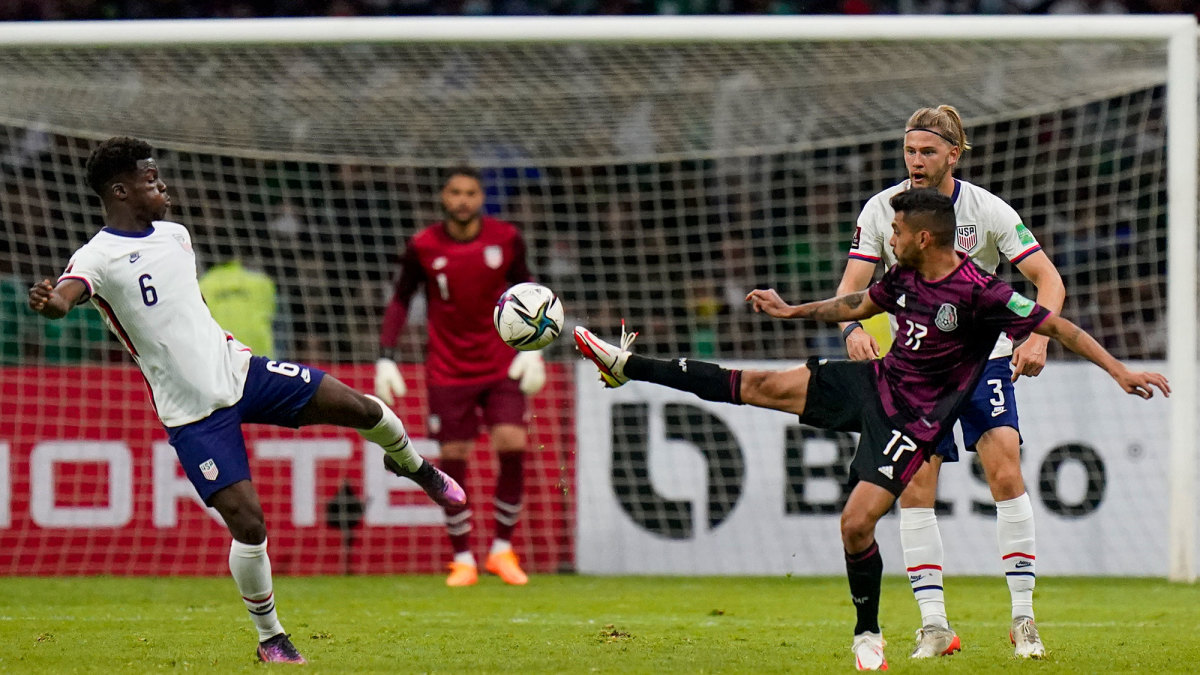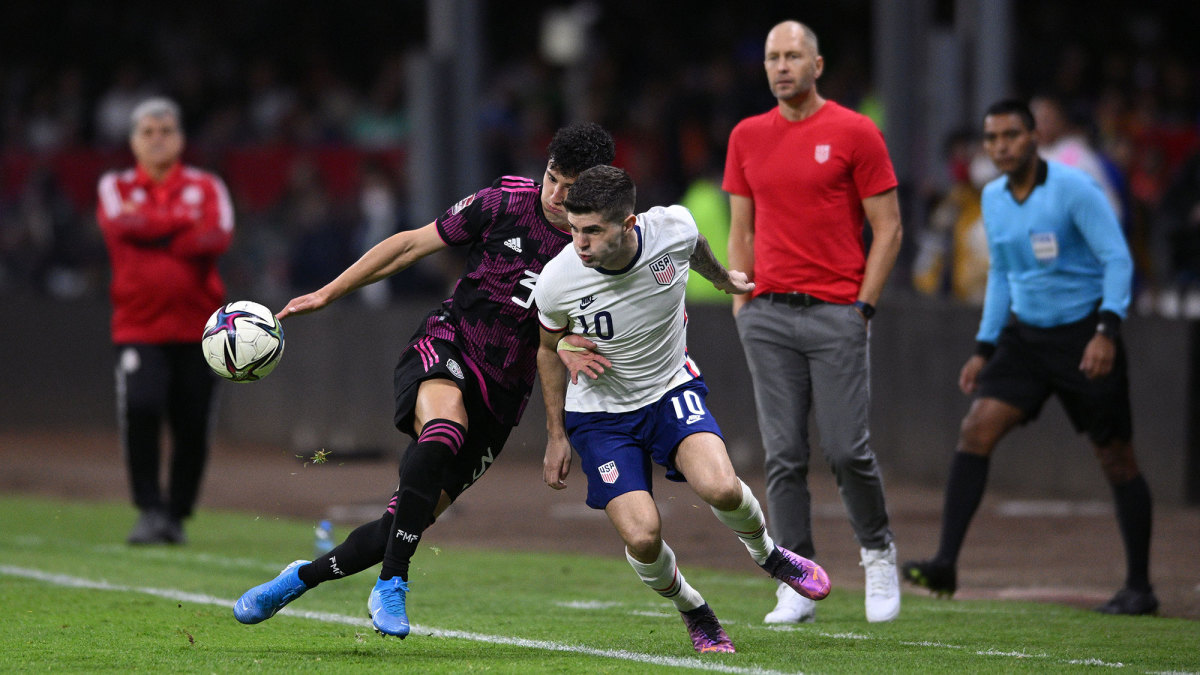For USMNT, a Vital Point Gained but Opportunity Squandered as Azteca’s Mystique Wanes
MEXICO CITY — If this really was the final World Cup qualifier between the U.S. and Mexico at the famed and fearsome Estadio Azteca, then the arena that had been a confidence-draining American graveyard for so many decades went out with a forlorn whimper.
The altitude remained the same: 7,200 feet. Just about everything else felt and sounded different than the mythic details from stories told by those who built the region’s most passionate rivalry. The crowd, limited to fewer than 50,000 by security and ID protocols enacted because of past homophobic chanting, seemed passive or resigned. The nearly vertical upper deck was mostly empty.
Mexico has been far from convincing during Concacaf’s World Cup qualifying competition and entered Thursday’s showdown having lost a record three straight to the young American men. El Tri coach Gerardo Martino was booed during pregame introductions. The organized Mexican supporters groups that usually add so much ferocity and color to proceedings were subdued or absent. And on a few occasions, the PA announcer resorted to yelling “México! México!” over the Azteca loudspeaker hoping to generate some atmosphere. At times, the 1,000-or-so U.S. fans behind the south goal were the loudest in the stadium.

Prior games at Azteca had been played before more than 100,000 partisans in the hazy mid-day heat. This one, at a smaller, refurbished, more corporate Azteca, was in the evening—cool and relatively even-tempered. And so the U.S. had perhaps its last best chance to win an official match on Mexican soil, while taking a massive step toward the Qatar World Cup along the way. Twice, they were on the threshold of history. But Christian Pulisic and Jordan Pefok missed point-blank sitters on either side of halftime, letting El Tri off the hook and helping seal a 0-0 tie.
Although the U.S. is now just 1-9-4 at Azteca (the win came in a 2012 friendly), the past three World Cup qualifiers ended in draws. The visitors were confident they could take advantage of the lull experienced by Mexico’s national team—and at its national stadium—and secure an unprecedented result. And for the most part they played like it. This wasn’t the defend and hold-on-for-dear-life sort of performance that past U.S. squads required here at this formidable venue, where Mexico had lost only two qualifiers in 50 years.
So it was both a point gained and a couple squandered, leaving the Americans (6-2-4) in second place in Concacaf’s Octagonal, three points behind the surprising Canadians and ahead of El Tri on goal difference. The top three finishers will book passage to the November-December World Cup and the fourth-place team will contest a one-game playoff against Oceania’s representative in June. The U.S. can seal one of those three automatic berths on Sunday evening in Orlando with a victory over fifth-place Panama (5-4-3) and a loss or draw by Costa Rica in El Salvador, or with a tie against Panama and a Costa Rica defeat. The U.S. and Los Ticos then meet in their Octagonal finale next Wednesday.
“It’s positive disappointment. That’s how I categorize it,” U.S. coach Gregg Berhalter said of Thursday’s showing and result. “The group is jazzed. They’re psyched. It was a good performance. We wanted to be the first team to beat Mexico at Azteca [in official competition] and we fell a little bit short. But the mood’s not down. Not at all. It’s the opposite. We know we’re going home.
“I can’t say enough about the effort of the guys. To expend that much energy at altitude like that is phenomenal.”

The U.S., Mexico and Canada are co-hosting the 2026 World Cup and so will qualify automatically. The Concacaf preliminaries almost certainly will change after that, as the expanded 48-team finals will have room for six or more entrants from North and Central America and the Caribbean. It’s unlikely that any format will seed the U.S. and Mexico in the same grouping, leaving many assuming that Thursday’s qualifier would be the last of its kind.
Amid the thick tension of the Octagonal stretch run, Berhalter, a former U.S. player with several rivalry games on his resume, still appreciated the significance of Thursday’s meeting. He said Wednesday that the U.S. was “happy and proud” to be competing upon this hallowed ground, the home of so much history and so many legends. Mexico’s sports daily Récord called Thursday’s match the “CLÁSICO DEL MILENIO” on its gameday front page. Much of the discussion during the past few days had been about Berhalter’s approach, and whether he’d risk fatigue or suspension at Azteca just 72 hours before the crucial home date with Panama. He answered that question emphatically, deploying a first-choice XI that matched his reverence for the rivalry and fit the occasion. You don’t send out a ‘B’ team for what could be the final World Cup qualifier between old enemies. You don’t contest the “Clásico of the Millennium” with one hand tied behind your back.
“In the end, this team has high aspirations for its performance,” Berhalter said. “We wanted to put a team, a group on the field, that we felt could win the game in Azteca. And that was the most important thing. So we’ll recover. There’s plenty of time to recover. We’ll get back to the States, we’ll have recovery [Friday] and prepare for Sunday.”
Berhalter’s decision did come at a cost. Winger Tim Weah and right back DeAndre Yedlin were cautioned and will miss the Panama game because of yellow-card accumulation. With right back Reggie Cannon already ruled out following a positive COVID-19 test, Shaq Moore flew from Tenerife to Orlando on Thursday. The 25-year-old has appeared in two qualifiers so far and was part of the squad that won the Concacaf Gold Cup last summer. Midfield anchor Tyler Adams escaped a yellow that would’ve ruled him out in Orlando, combining with Kellyn Acosta and Yunus Musah to make the Mexicans work hard and keep the game on level terms. Although El Tri occasionally found ways around the midfield trio and hit a number of dangerous crosses, its final product was lacking.
But the same could be said of the Americans. The game’s two best chances, by far, fell to the visitors. In the 35th minute, Pulisic made a smart run through the center of the penalty area to meet a timely Weah cross. But the Chelsea star, who’s been in outstanding form in England, sent his bid straight at veteran Mexican goalkeeper Guillermo Ochoa. In the 72nd minute, substitute winger Gio Reyna found reserve striker Jordan Pefok alone in front of the Mexican goal. Like Pulisic, Pefok has been brilliant in Europe, scoring at will for Swiss champ Young Boys. But whatever ghosts the Azteca had left seemed to knock Pefok off kilter at the worst moment, and his shot from six yards missed by much more than that to the right.
Three of the top five scorers in U.S. men’s national team history—Landon Donovan, Clint Dempsey and team GM Brian McBride—were all in attendance Thursday. Berhalter’s team would be a lot closer to Qatar if it had someone with a finishing touch that resembled theirs.
“We did have chances to win the game and we didn’t convert,” said Pulisic, who scored twice against Mexico in 2021. “I’m disappointed. I missed a chance and would’ve loved to have won the game. … I thought we had the bigger chances in the game. We did have control for big spurts of the game. But I think it’s a game that could’ve gone either way.”

Mexico had the better of the play late—the crowd even got into it a bit—but couldn’t find the winner as Berhalter went to a five-man back line to preserve the draw and the point. The highlight of the second half, however, was Reyna’s audacious, 1-vs.-7 run through the Mexican midfield that seemed to continue forever and still fell way short of creating a scoring chance. It was spectacular nevertheless, and it was a fitting symbol of the 19-year-old’s return from a lingering hamstring injury and of the U.S. youth that’s tilted this rivalry toward the north.
It also kindled a recollection of what the Azteca used to be.
“Mexico was the host of the ’86 World Cup where Maradona scored his wonderful goal [against England], and I had visions of that while Gio was dribbling,” Berhalter said.
The U.S. coach would’ve been in middle school when Diego Maradona set Mexico alight, and Reyna was many years from being born. But that’s the power of this stadium, which has hosted two World Cup finals, minted a million memories and, for decades, stood as concrete testament to Mexico’s regional dominance. For that power to be funneled toward the feet of a young American seemed like a poignant way to close this chapter.
“I don’t know about that,” Reyna said somewhat sheepishly when told of Berhalter’s comparison. “But it was a nice run.”
And it was a nice run for the Azteca. While the U.S. didn’t exactly turn out the lights, it did steal some of its mystique. Now it has to catch its breath, recover and turn the page.
“When I think about each and every player leaving every bit of energy out there on the field, it was an extremely good effort by the group. It gave us a valuable point on the road which sets us up well in the standings,” Berhalter said. “We’re getting close. … We’re looking forward to getting back home and having a good performance.”
More Soccer Coverage:
